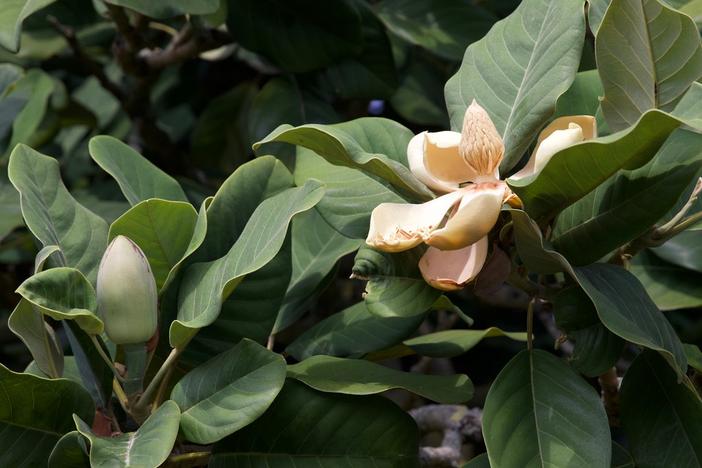Chinese Evergreen Magnolia
(Magnolia delavayi)
Chinese Evergreen Magnolia (Magnolia delavayi)
/
/

Malcolm Manners
CC BY 2.0
Image By:
Malcolm Manners
Recorded By:
Copyright:
CC BY 2.0
Copyright Notice:
Photo by: Malcolm Manners | License Type: CC BY 2.0 | License URL: https://creativecommons.org/licenses/by/2.0/ | Uploader: mmmavocado | Publisher: Flickr
















Estimated Native Range
Summary
Magnolia delavayi, commonly known as Chinese Evergreen Magnolia, is an evergreen tree native to the subtropical montane forests and valleys of Southern China. It can grow to a height of 8–15 meters (26–49 ft) and is characterized by its gray to grayish-black bark. The large, fragrant, cup-shaped flowers are a notable feature, measuring 15–25 cm across with nine thick, creamy white to pink tepals, and bloom from late spring to early summer. The flowers are particularly showy, making it a prized ornamental tree.
The Chinese Evergreen Magnolia is valued for its lush evergreen foliage and large, aromatic flowers that can add a tropical feel to gardens. It is increasingly used in urban landscapes, private gardens, and as a specimen tree. While it is relatively uncommon in cultivation outside its native range, it is gaining popularity, especially the red-flowered cultivar. This tree requires consistently moist soil, and while it can tolerate full sun, it thrives in part shade, which mimics the dappled light of its native habitat. It is important to provide protection from strong winds and to mulch well to maintain soil moisture. Potential problems include scale insects and leaf spot diseases, but these are generally not severe.CC BY-SA 4.0
The Chinese Evergreen Magnolia is valued for its lush evergreen foliage and large, aromatic flowers that can add a tropical feel to gardens. It is increasingly used in urban landscapes, private gardens, and as a specimen tree. While it is relatively uncommon in cultivation outside its native range, it is gaining popularity, especially the red-flowered cultivar. This tree requires consistently moist soil, and while it can tolerate full sun, it thrives in part shade, which mimics the dappled light of its native habitat. It is important to provide protection from strong winds and to mulch well to maintain soil moisture. Potential problems include scale insects and leaf spot diseases, but these are generally not severe.CC BY-SA 4.0
Plant Description
- Plant Type: Tree
- Height: 20-30 feet
- Width: 15-25 feet
- Growth Rate: Moderate
- Flower Color: White
- Flowering Season: Spring, Summer
- Leaf Retention: Evergreen
Growth Requirements
- Sun: Full Sun, Part Shade
- Water: High
- Drainage: Medium
Common Uses
Bee Garden, Bird Garden, Butterfly Garden, Deer Resistant, Fragrant, Hedges, Showy Flowers, Street Planting
Natural Habitat
Subtropical montane forests and valleys of Southern China
Other Names
Common Names: Delavay’s Magnolia
Scientific Names: , Magnolia delavayi, Magnolia carpunii, Lirianthe delavayi, Manglietia delavayi,
GBIF Accepted Name: Magnolia delavayi Franch.